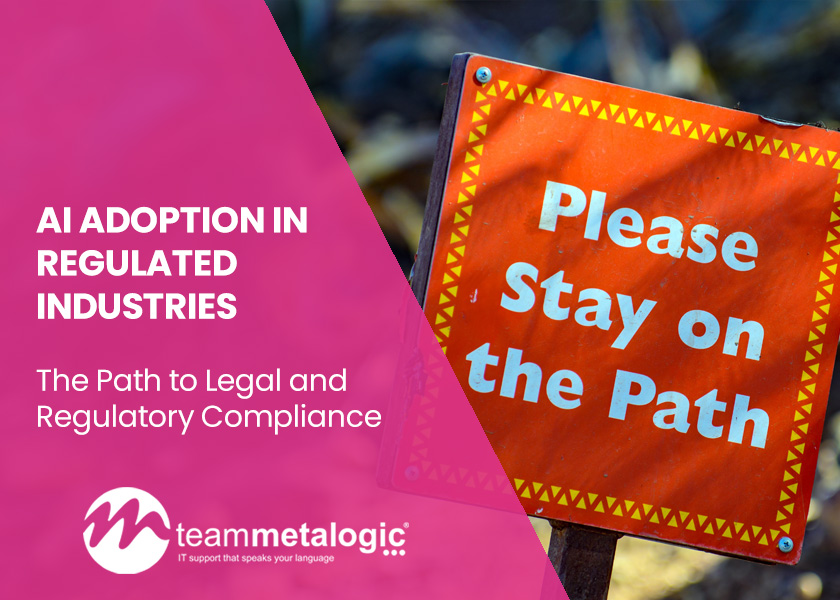Adhering to the Rulebook
The integration of Artificial Intelligence (AI) in regulated industries across the UK has ushered in a new era of efficiency and innovation. AI’s ability to analyse vast datasets, streamline processes, and enhance decision-making is transforming sectors such as finance, healthcare, and legal services. However, the adoption of AI in regulated environments also raises complex legal and regulatory compliance challenges. In this article, we will delve into the significance of legal and regulatory compliance in AI adoption, the potential pitfalls, and how organisations, in collaboration with managed IT service providers like Team Metalogic, can navigate the regulatory landscape effectively.
The Importance of Legal and Regulatory Compliance in AI Adoption
Regulated industries are subject to stringent laws, regulations, and ethical standards designed to protect consumer rights, ensure data privacy, and maintain fair and responsible practices. As AI technologies evolve, ensuring legal and regulatory compliance becomes even more critical. Failure to meet compliance requirements can result in severe consequences, including hefty fines, reputational damage, and even legal liabilities.
The Challenges of AI Compliance in Regulated Industries
- Data Privacy: AI requires access to vast amounts of data, some of which may be sensitive or personally identifiable information. Compliance with data protection regulations, such as the General Data Protection Regulation (GDPR), poses significant challenges for organisations, especially when partnering with AI vendors.
- Explainability: The “black box” nature of some AI algorithms can make it challenging to provide transparent explanations for the decisions made by AI systems. This lack of explainability can raise concerns about AI’s fairness, accountability, and compliance with regulations that require understandable decision-making.
- Bias and Fairness: AI algorithms can inadvertently perpetuate biases present in the training data, leading to discriminatory outcomes. Regulated industries must ensure that AI models adhere to fairness and non-discrimination principles, a crucial aspect of legal and regulatory compliance.
- Intellectual Property: AI adoption may involve the use of pre-trained models or proprietary algorithms developed by AI vendors. Regulated industries must navigate intellectual property rights and licensing agreements to comply with copyright and patent laws.
The Role of Managed IT Service Providers in Ensuring Compliance
Managed IT service providers, such as Team Metalogic, play a vital role in helping regulated industries navigate the complexities of legal and regulatory compliance in AI adoption. These providers offer expertise in data privacy, explainable AI, bias mitigation, and intellectual property rights, ensuring that organisations adopt AI solutions that align with regulatory requirements.
- Data Privacy and Security: Managed IT service providers assist in developing robust data privacy and security frameworks. They ensure that AI systems adhere to data protection regulations, implement encryption protocols, and establish stringent access controls to safeguard sensitive information.
- Explainable AI: To address the challenges of explainability, managed IT service providers help organisations implement AI models that are transparent and interpretable. They employ techniques to make AI decision-making more understandable to stakeholders and regulatory authorities.
- Bias Mitigation: Managed IT service providers work closely with regulated industries to identify and mitigate bias in AI algorithms. They implement strategies to ensure that AI models provide equitable outcomes and do not perpetuate unfair practices.
- Intellectual Property Management: Managed IT service providers aid in assessing licensing agreements and intellectual property rights related to AI technologies. They ensure that organisations comply with legal requirements and protect their intellectual property while adopting AI solutions.
Strategies for Effective Legal and Regulatory Compliance
Conduct Thorough Assessments: Before implementing AI solutions, regulated industries must conduct comprehensive risk assessments and compliance audits. This evaluation should encompass data privacy, fairness, bias, and intellectual property considerations.
Develop Robust Policies and Procedures: Establish clear policies and procedures for AI adoption, including data handling, decision-making processes, and transparency requirements. These policies should align with existing legal and regulatory frameworks.
Implement Regular Training: Provide training and awareness programs for employees involved in AI adoption. This education should focus on legal and regulatory compliance, ethical AI use, and the responsible handling of sensitive data.
Monitor and Evaluate AI Systems: Continuous monitoring of AI systems is crucial for identifying compliance risks and potential biases. Regular evaluations help organisations adapt their AI models to changing regulatory landscapes and emerging best practices.
What next?
The integration of AI in regulated industries promises unprecedented advantages, transforming operational efficiency and enhancing decision-making capabilities. However, achieving legal and regulatory compliance in this dynamic landscape is of paramount importance. Organisations must navigate the complexities of data privacy, explainability, fairness, and intellectual property while embracing the potential of AI.
Managed IT service providers like Team Metalogic play a pivotal role in helping regulated industries navigate the path to compliance. By providing expertise in data privacy, explainable AI, bias mitigation, and intellectual property management, these providers empower organisations to adopt AI solutions that meet regulatory requirements while delivering optimal performance.
Strategies such as thorough assessments, robust policies, regular training, and continuous monitoring form the foundation of effective legal and regulatory compliance in AI adoption. By prioritising compliance and collaborating with managed IT service providers, regulated industries can harness the transformative power of AI while adhering to the rulebook of legal and regulatory standards.
Links
ICO – GDPR compliance guide https://ico.org.uk/media/for-organisations/guide-to-data-protection/guide-to-the-general-data-protection-regulation-gdpr-1-1.pdf
FCA approach to AI – https://www.fca.org.uk/news/speeches/our-emerging-regulatory-approach-big-tech-and-artificial-intelligence
https://www.fca.org.uk/news/speeches/innovation-ai-future-financial-regulation
Law Society UK guide to use of AI – https://www.lawsociety.org.uk/topics/research/ai-artificial-intelligence-and-the-legal-profession

